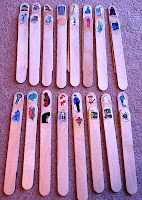- If you have a super young, or super resistant child, don't do a structured activity at all. Instead, play a game, but keep a speech goal in mind. For example, fill a shallow dish with bubble juice and blow bubbles in it with a straw until the dish is full of bubbles. Then let the child pop bubbles with their finger and encourage them to say "Pop!" Or play with toy cars and frequently make them crash using the words "Beep," "Vroom", "Oh, no!", "Boom," etc. Build a block tower and say, "Up!" every time you put on a new block. Pick an activity the child will enjoy and consciously plan your speech goals for that activity. Your goal is to get your child to say the chosen words as many times as possible while playing the game.
- Read the book: The Big Book of Exclamations by Teri K. Peterson with your child. Pay attention to the instructions in the book. Once you get the idea, you can use the same strategies with any picture book. Use them when reading to your child for at least 15 minutes a day. That's speech practice.
- Incorporate my speech practice booklets (look at list at the end of this post) into your bedtime or naptime routine. Begin by simply reading the story to your child several times to familiarize them with the story and pictures. Then, begin pausing at each picture and pointing to it to encourage them to say the word and help you "read" the book. Every time you read the book with your child, put a sticker on the front of the book. My children love this activity, particularly if it gets them a couple of extra minutes with a parent before lights out.
- If you really feel like your child is ready for more structured practice, begin with short sessions. Really short. No more than five minutes. If necessary, offer a reward when done. You decide when the session ends, not your child. So, if you sense that you can only get two more words from your child, tell them, "Two more, and then you're done and you can get your sticker (watch tv, have a piece of candy, etc.) You can fade out the rewards later. Right now, your goal is to get them to expect speech practice as a perfectly natural activity that will be a regular part of their daily life just like brushing teeth. Gradually increase the length of sessions.
- Every child is different. I've tried lots of games with my little ones, but they honestly do quite well just practicing the cards in a drill format. I do five to 15 cards at a time and then offer a small treat (a single yogurt melt, or M&M or smartie). By the time they chew up that one treat, I have the next set of 5-15 ready to go. In that way I can get them to practice lots of words in even a short practice session. I keep my manner animated and throw in lots of praise. I try to keep the mood light.
- Other children will not do well in drill format. I have lots of speech games ideas on the blog (see list at end of post). Read through them and choose one you think might work well with your child. You know your child best and should be able to make pretty good guesses about which ideas will work and which won't. (Highly recommended: Speech Switcheroo, Find-It, Speech Tiles, and Magnetic Speech Cards.)
- Keep your long term goals in mind. If sitting down and trying to do structured sessions isn't working right now, make a decision to wait 6 weeks and then start over again. During the break use the indirect methods I discussed in #1-3. When you try structured sessions again in 6 weeks remember to start short and easy. Your goal is to get them to enjoy sitting down to do speech with you. You can increase the length and intensity of the sessions gradually. Consider beginning with easy words they can already make for a couple of weeks just to get them used to the routine of speech practice.
I hope that helps. Good luck!
Speech Games and Activities
- 10 Card Set Game and Activity Ideas
- Simple Speech Card Puzzles
- Speech Card Stories
- Speech Card Caterpillar
- Speech Card Game: What's Hiding?
- Speech Card Game: Speech Switcheroo (An Uno-Style Game)
- Speech Card Set Activity: Magnetic Speech Cards
- Speech Card Game: Speech Fours
- Speech Card Game: Old Maid
- Speech Card Set Activity: Bang!
- Speech Card Set Activity: What's Hiding Behind Door Number...?
- Speech Card Set Activity: Customizing a Homework Sheet
- Speech Card Set Activity: Making a Simple Sentence Flipbook
- Speech Game: Speech Stick Match
- Speech Game: Speech Tiles
- Printable Worksheet: Initial S
- Speech Game: Find It
Speech Practice Booklets Available:
If anyone has any other great ideas or tips, please share in the comments.
















